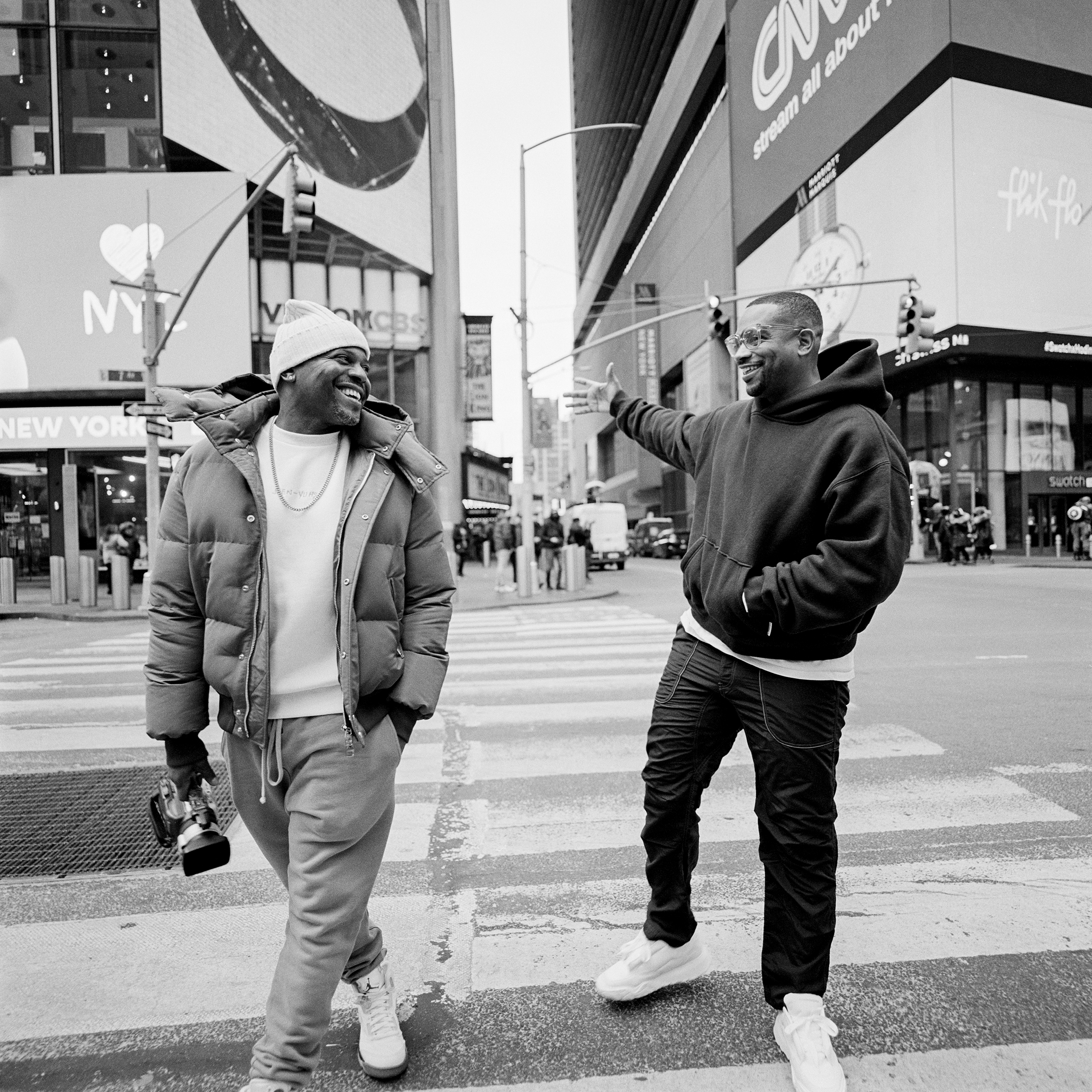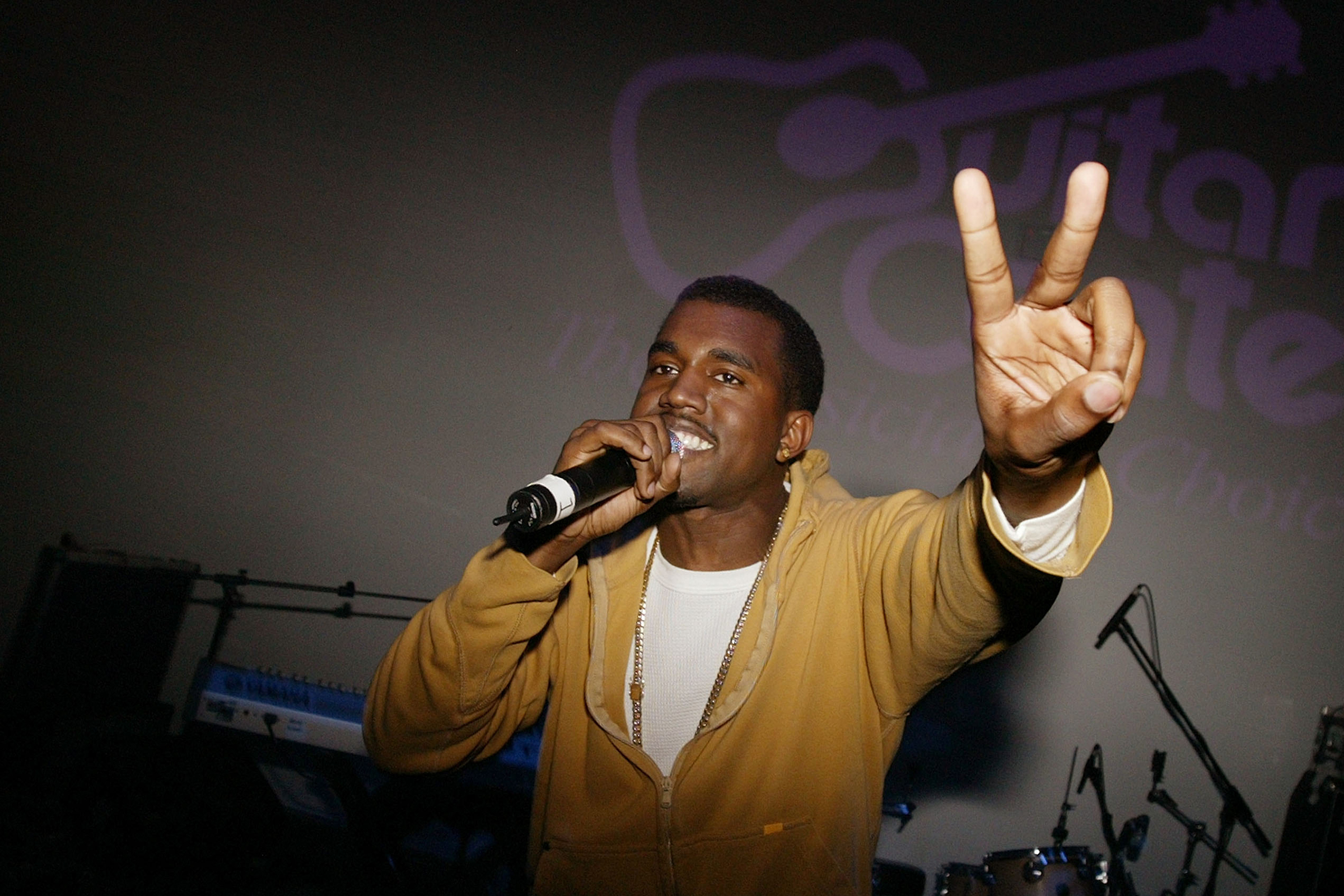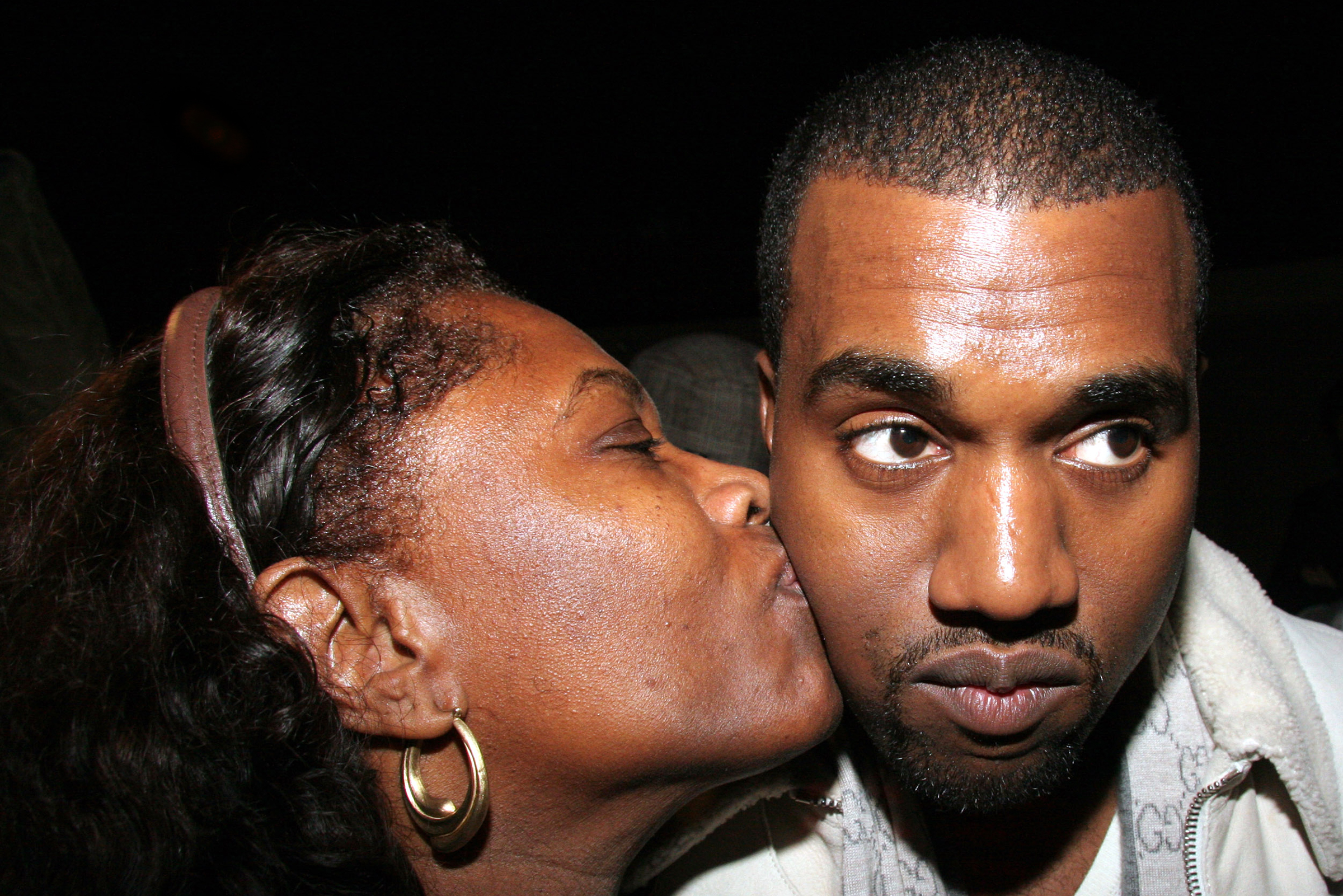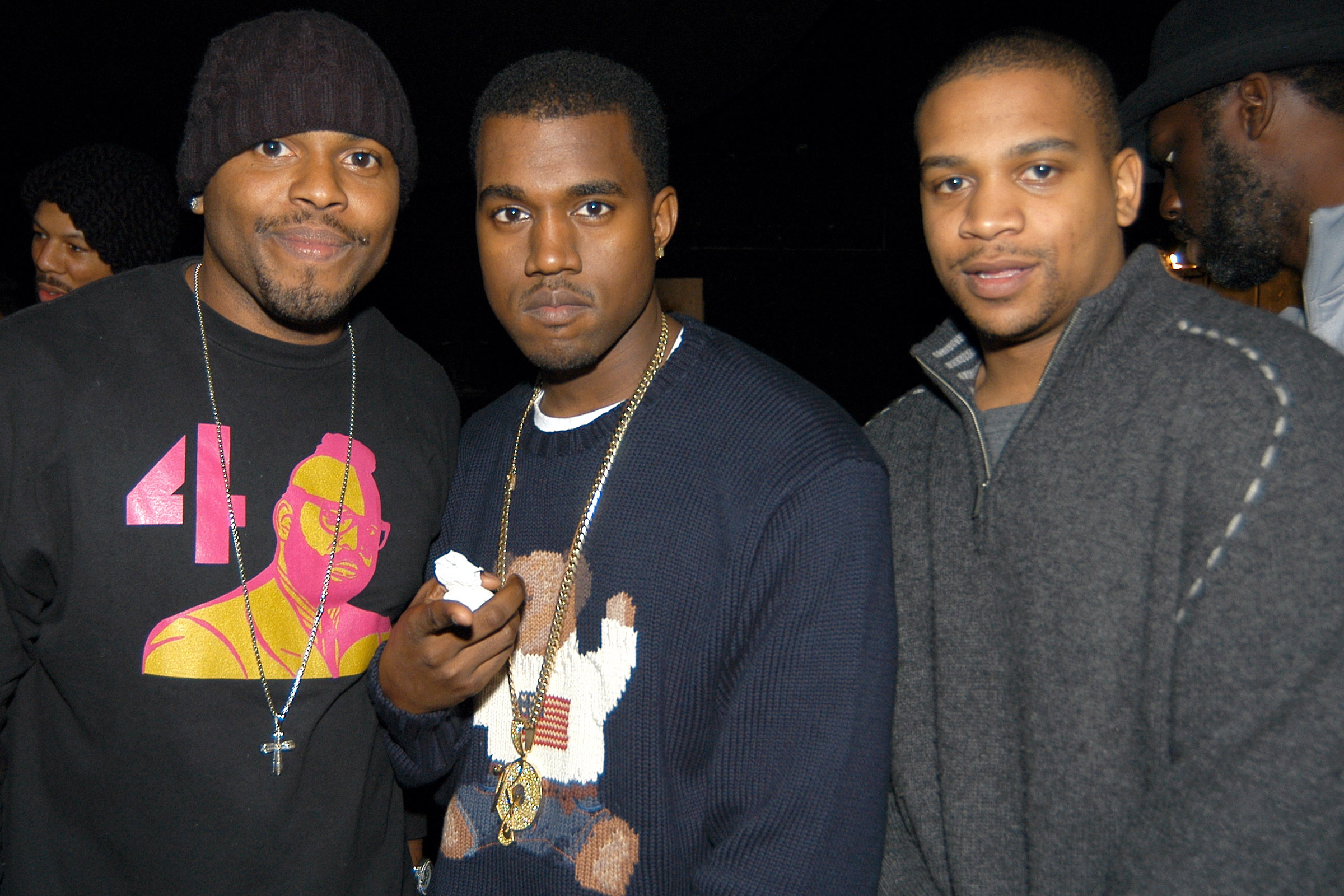
When you look at Kanye West, what do you see? An egomaniac? A hip-hop legend? A god? Is he “very cool,” to quote Donald Trump, or “a jackass,” to quote Barack Obama?
When Coodie Simmons looks at Kanye West, he sees a brother. The filmmaker, a fellow Chicagoan, met West—who recently changed his legal name to Ye—at a South Side barbershop in 1995. Intrigued by his combustible talent and charisma, Simmons began filming him for a documentary he hoped to release once West won his first Grammy. Simmons racked up hundreds of hours of footage in which West chased down industry executives, feuded with former collaborators, and winced through jaw surgery following a life-changing car accident. But after West won multiple Grammys in 2005 and grew increasingly famous and erratic, he and Simmons fell out, seemingly quashing any hopes Simmons had of telling his story.
Until now. On Feb. 16, Simmons and his creative partner Chike Ozah will release their three-part West documentary, Jeen-Yuhs: A Kanye Trilogy, on Netflix. (Jeen-Yuhs is produced by TIME Studios, the film and television division of TIME.) Jeen-Yuhs is far from a conventional biodoc: there are no talking heads or dutiful timelines, and Simmons’ camerawork is often lo-fi and shaky.

But the documentary’s lack of polish is purposeful, serving as a rare window into West’s psyche. Simmons put his own tumultuous relationship with West at the center of the story to disentangle the man, born Kanye Omari West, from the sprawling mythos that currently engulfs him. In doing so, he and Ozah build a riveting narrative about the importance of faith, in several senses of the word. “This isn’t the definitive Kanye West documentary,” Ozah says. “We wanted to use our footage as a tool, especially for other Black people that come from the communities we come from, to feel comfortable to have a higher belief in God; to get past their fears and unlock their own genius.”
Early Career Struggles
There was a time when Simmons and West more or less existed upon the same level of fame. In the late ’90s, Simmons had made a name for himself hosting the Chicago public-access TV show Channel Zero, which lovingly captured hip-hop culture. In the same city, the teenage West was producing and making music with local artists. “He would come up to the barbershop and be playing his beats for all of us,” Simmons recalls. “He always loved me putting the camera on him; he was really in your face.”
When West moved to Newark, N.J., in 2000 to be closer to hip-hop’s power center, Simmons began pursuing a documentary about Michael Jordan’s rumored return to the NBA. But one day after returning from Miami—where he filmed Magic Johnson, Puffy, and Jennifer Lopez talking about their love for Jordan—Simmons was robbed at gunpoint in Chicago, losing his car and footage.
Stunned and unmoored, Simmons decided to use the insurance money to follow West to New York. “That carjacking was an angel for me: taking that adversity and making it work.”
Over the next couple of years, Simmons stood side by side with West as the pugnacious rapper struggled in a hip-hop ecosystem dominated by gangster rap. Simmons captured West storming the offices of Roc-a-Fella Records, blasting now classic records like “All Falls Down” as employees there ignored him; waiting for Burger King dinners; getting roasted by other rappers for his saliva–soaked retainer. West’s momentum had slowed to an agonizing crawl.

One of the few people who believed wholeheartedly in West’s potential in these early days was his mother Donda. She features prominently in Jeen-Yuhs, serving as a spark plug and guardian who offers sage advice and endless encouragement. Even more so than West’s latest album Donda, the documentary reveals the outsize impact she had, and still has, on her son’s creativity, ferocity, and hustler’s approach to the world. “You have to be able to see yourself … to see it when no one else can see it,” she wrote in her 2007 memoir, Raising Kanye. “You have to speak things into creation.”
Simmons, too, played a key role in West’s career as the wheels started to turn. The filmmaker used his connections to help West clear classic R&B samples—a hallmark of the rapper’s early hits—and co-directed, with Ozah, his first music video, “Through the Wire.” Instead of recording, West would rap early ideas directly into Simmons’ camera, using the raw footage to build songs. “I hated that,” Simmons recalls. “I used to think, ‘Jay-Z and them are at the studio. Why are we sitting here and you rapping to me?’”

The Fall and the Redemption
West’s persistence paid off, and he soon ascended to the top. But in doing so, he abandoned his partnership with Simmons in favor of more established filmmakers like Hype Williams. In an agonizing sequence in the docuseries, a drunken West mistakenly calls Simmons “Chike” at a Grammys afterparty. “There’s been times I never want to show that footage of him dissing me,” Simmons says. “It was sickening.”
Despite the distance, Donda West took Simmons under her wing, giving him jobs and inviting him over for Christmas. But in 2007, she died from complications postsurgery, sending Kanye and Simmons into tailspins. Simmons edited an in-memoriam video for her funeral through tears.
After Donda’s death, Simmons lost touch with West for six years. He was stuck: he had hours of incredible footage but no leverage to do anything with it. “Why fight a no-win fight knowing I’m not in the mix of Ye and his team?” he says. But in 2016, when West was making headlines for increasingly incoherent monologues and his support of Donald Trump, the pair reconnected, with West asking Simmons to accompany him on a trip to China. Simmons says he was less focused on getting the footage to finish his film than in supporting his friend. “My camera was like a disguise, because he knows me having a camera all this time,” he says. “People would be like, ‘He just a cameraman.’ Meanwhile, me and Kanye were having real serious, deep conversations about meditation and Jesus.”
During this second period of filming, West’s mood swung unpredictably, as he ranted about his hospitalization (for what was described by dispatchers as a “psychiatric emergency”) and his support for Tucker Carlson. Simmons was uncomfortable, even shutting his camera off when he felt West was going off the rails.
But Simmons also understood how West’s most extreme displays of hot-headed aggression were extensions of the ethos that had fueled his earliest successes. West’s entire modus operandi had been to smash barriers; his power arose precisely from the fact that he did things people said he shouldn’t.
Two decades after their first meeting, Simmons finally persuaded West to let him and Ozah tell their story, which is now about friendship and the turbulent forces of fame, grief, and God. “Our work is about impact: to help people feel comfortable following their dreams and passions,” Ozah says. “That may not have been the goal when Coodie started shooting it. But this film took on its own journey.”
West initially agreed to the vision. But true to form, he proved unpredictable, and in January demanded “final edit and approval” of the series in an Insta-gram post. Simmons and Ozah were disappointed, and declined to give him that authority. They didn’t make this film for West, after all. “I’m not a videographer and I never was: I was always directing a documentary,” Simmons says. But he knows, better than almost anyone, that the contradictions that can make West frustrating are also the ones that can make him singularly great. “The old Kanye is just Kanye,” Simmons says. “He still has that hunger.”
jeen-yuhs: a Kanye Trilogy premieres on Netflix beginning Feb. 16. Twenty-four years in the making, this documentary about Kanye West was directed by Coodie & Chike, from TIME Studios and Creative Control.
More Must-Reads from TIME
- Cybersecurity Experts Are Sounding the Alarm on DOGE
- Meet the 2025 Women of the Year
- The Harsh Truth About Disability Inclusion
- Why Do More Young Adults Have Cancer?
- Colman Domingo Leads With Radical Love
- How to Get Better at Doing Things Alone
- Michelle Zauner Stares Down the Darkness
Contact us at letters@time.com



